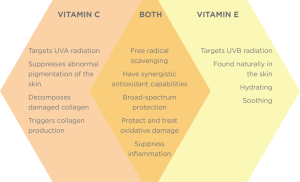A quality, vitamin C serum provides a range of skin benefits that include even skin tone and better hydration for the appearance of youthful, glowing skin. Vitamin C is an antioxidant and fights against the daily breakdown of the skin’s nutrients by harmful elements like the sun’s UV rays and pollution. Dermatologists recommend adding a vitamin C product to a skin-care routine because it’s a powerhouse when combined with other antioxidant, skin-care products.
A number of studies show that one of the top reasons that skin ages is because damaging molecules called free radicals attack healthy skin cells and change their composition. When skin cells are damaged, they no longer function or look the way normal, youthful cells do. Antioxidant serums like vitamin C are proven to fight free radicals to slow down or stop the damage they can do to the skin.
But a rumor that vitamin C should not be used on the skin because it slows elastin production down is growing. The rumor takes basic science knowledge and misinterprets the facts, giving the super antioxidant, vitamin C a bad wrap. Does vitamin C slow down elastin production? Yes, but it’s a good thing and here’s why.
When sunshine, specifically UV rays, contact skin, these rays create free radicals that damage skin DNA, proteins and connective tissue like elastin and collagen. The free radical damage from sun exposure leads to aging, wrinkles and sunspots.
One of the skin’s defense mechanism to a UV or free radical attack is to produce more elastin. But elastin is not a protein one wants to stimulate in large amounts. When elastin is overproduced during sun exposure, its normal, healthy level of regulation slows down. Instead, too many elastin fibers are produced too fast and create unwanted, elastin cross-fibers that are less elastic. And these elastin defects are what’s associated with saggy, wrinkled skin.
Two skin components that are worth stimulating are fibroblasts and collagen. Both can be damaged from sun exposure and tend to slow down in production with age. Vitamin C increases the cellular turnover of fibroblasts, resulting in younger, smoother skin. Vitamin C also stabilizes existing levels of collagen and elastin by protecting skin cells against free radical damage, while encouraging new collagen to produce faster. This means that vitamin C is effectively increasing the production of collagen in damaged skin while maintaining a slower and healthier synthesis level of elastin.
Vitamin C is a powerful antioxidant because it maintains a fine balance between boosting collagen production while decreasing elastin production to a moderate rate. So the next time someone warns that vitamin C slows elastin production down, tell them they’re right and it’s a good thing.

